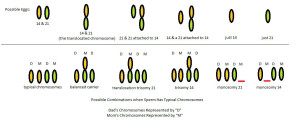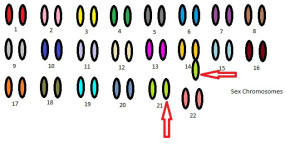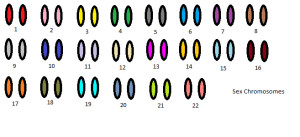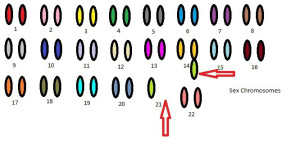Since learning I’m a balanced carrier, I’ve met with several genetics counselors to talk about what it all means. This is my layman’s explanation – always speak with a genetic counselor when you have questions about your specific karyotype and situation. Here’s a link to the website shared with me when I first learned I am a balanced carrier.
Translocation Down syndrome represents about 4% of all instances of Down syndrome. Most of the time, that translocation is random. Sometimes, the translocated chromosome is passed down from a parent who is known as a “balanced carrier.”
Typically, human beings have 46 chromosomes arranged in 23 pairs. (22 pairs of chromosomes and two sex chromosomes)
A balanced carrier has one “single” chromosome 21, and the other 21 is attached to another chromosome. In my examples here, I’ll be using my own karyotype: my 21st chromosome is attached to one of my 14th chromosomes. A carrier still has just two of each chromosome so there are no side effects other than what happens when a carrier conceives.
A balanced carrier can produce 6 types of eggs (or sperm – men can be carriers, too) which results in 6 possible combinations at conception.
 It is possible for a balanced carrier to have a child with typical chromosomes, a child who is a carrier like themselves, or a child who has translocation Down syndrome. The other possible combinations are considered incompatible with life. (Trisomy 14, Monosomy 14, and Monosomy 21) Because of this, female carriers often have a higher rate of miscarriage than the typical population.
It is possible for a balanced carrier to have a child with typical chromosomes, a child who is a carrier like themselves, or a child who has translocation Down syndrome. The other possible combinations are considered incompatible with life. (Trisomy 14, Monosomy 14, and Monosomy 21) Because of this, female carriers often have a higher rate of miscarriage than the typical population.
Learning that you are a balanced carrier may come as a surprise, and you might have unexpected feelings surrounding this news. Everything you are feeling is normal. It’s another thing to process as you learn more about Down syndrome itself.
*****
If you have received a new Down syndrome diagnosis, I encourage you to check out the following resources:
www.downsyndromepregnancy.org
www.dsdiagnosisnetwork.org
Welcome to the family!




